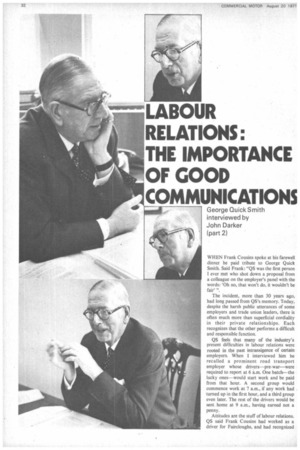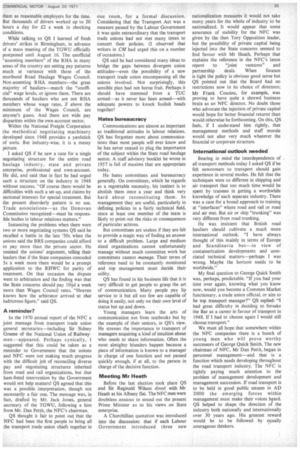LABOUR RELATIONS: THE IMPORTANCE OF GOOD COMMUNICATIONS
Page 34

Page 35

If you've noticed an error in this article please click here to report it so we can fix it.
WHEN Frank Cousins spoke at his farewell dinner he paid tribute to George Quick Smith. Said Frank: "QS was the first person I ever met who shot down a proposal from a colleague on the employer's panel with the words: 'Oh no, that won't do, it wouldn't be fair' ".
The incident, more than 30 years ago, had long passed from QS's memory. Today, despite the harsh public utterances of some employers and trade union leaders, there is often much more than superficial cordiality in their private relationships. Each recognizes that the other performs a difficult and responsible function.
QS feels that many of the industry's present difficulties in labour relations were rooted in the past intransigence of certain employers. When I interviewed him he recalled a prominent road transport employer whose drivers—pre-war—were required to report at 6 a.m. One batch—the lucky ones—would start work and be paid from that hour. A second group would commence work at 7 a.m., if any work had . turned up in the first hour, and a third group even later. The rest of the drivers would be sent home at 9 a.m., having earned not a penny.
Attitudes are the stuff of labour relations. QS said Frank Cousins had worked as a driver for Faircloughs, and had recognized
them as reasonable employers for the time. But thousands of drivers worked up to 20 hours a day for £2 a week in shocking conditions.
While talking to QS I learned of fresh drivers' strikes in Birmingham, in advance of a mass meeting of the TGWU officially postponed until August 16. The unofficial 'assenting members" of the RHA in Many areas of the country are setting pay patterns much at variance with those of the moribund Road Haulage Wages Council. Non-assenting RHA members—the great majority of hauliers—match the "unofficial" wage levels, or ignore them. There are thousands of hauliers who are not RHA members whose wage rates, if above the minimum of the Wages Council, are anyone's guess. And there are wide pay disparities within the own account sector.
Within the National Freight Corporation the methodical negotiating machinery developed since 1948 provides a yardstick of sorts. But industry-wise, it is a messy picture.
I asked QS if he saw a case for a single negotiating structure for the entire road haulage industry, state and private enterprise, professional and own-account. He did, and said that in fact he had urged such a structure on the industry in 1948 without success. "Of course there would he difficulties with such a set-up, and claims by sectional interests for special treatment. But the present disorderly pattern is no use. Trade associations--as the Donovan Commission recognized—must be responsible bodies in labour relations matters."
Instancing the problems when there were two or more negotiating systems QS said he recalled a battle in the late '50s when the unions said the BRS companies could afford to pay more than the private sector. He resisted the unions' argument, telling their leaders that if the State companies conceded 5s a week more there would be a prompt application to the RHWC for parity of treatment. On that occasion the dispute went to arbitration and the finding was that the State concerns should pay 10+d a week more than Wages Council rates. "Heaven knows how the arbitrator arrived -at that ludricrous figure," said QS.
A reminder?
In the 1970 annual report of the NFC a joint message from transport trade union general secretaries—including Sir Sidney Greene of the National Union of Railwaymen—appeared. Perhaps cynically, I suggested that this could be taken as a reminder to Government that the unions and NFC were not making much progress with the difficult job of reconciling diverse pay and negotiating structures inherited from road and rail organizations, but that ham-fisted intervention by the Government would not help matters! QS agreed that this was a possible interpretation, though not necessarily a fair one. The message was, in fact, drafted by Mr. Jack Jones, general secretary of the TGWU, following a hint from Mr. Dan Pettit, the NFC's chairman.
QS thought it fair to point out that the NFC had been the first people to bring all the transport trade union chiefs together in one room, for a formal discussion. Considering that the Transport Act was a measure passed by the Labour Government it was quite extraordinary that the transport trade unions had not met many times to concert their policies. (I observed that writers in CM had urged this on a number of occasions.) QS said he had considered many ideas to bridge the gaps between divergent union attitudes—even the possibility of a new transport trade union encompassing all the unions involved. Not surprisingly, this sensible plan had not borne fruit. Perhaps it should have stemmed from a TUC armed—as it never has been armed—with adequate powers to knock foolish heads together!
Hates bureaucracy
Communications are almost as important as traditional attitudes in labour relations. QS has forgotten more about communications than most people will ever know and he has never ceased to plug the importance of the subject within the State road haulage sector. A staff advisory booklet he wrote in 1957 is full of maxims that are appropriate today.
He hates committees and bureaucracy generally. On committees, which he regards as a regrettable necessity, his instinct is to abolish them once a year and think very hard about reconstituting them. In management they are useful, particularly in defining policies in a fairly technical field, since at least one member of the team is likely to point out the risks or consequences of particular actions.
But committees are useless if they are felt to provide a magic way of finding an answer to a difficult problem. Large and medium sized organizations cannot unfortunately manage without much committee work but committees cannot manage. Their terms of reference need to be constantly monitored and top management must decide their utility.
QS has found in his business life that it is very difficult to get people to grasp the art of communication. Many people pay lip service to it but all too few are capable of doing it easily, not only on their own level of status but up and down.
Young managers learn the arts of communication not from textbooks but by the example of their seniors, in QS's view. He stresses the importance in transport of managers acquiring a kind of intuition about who needs to share information. Often the most almighty blunders happen because a piece of information is known to a manager in charge of one function and not passed quickly enough, if at all, to the person in charge of the decisive function.
Meeting Mr Heath
Before the last election took place QS and Sir Reginald Wilson dined with Mr Heath at his Albany flat. The NFC men were doubtless anxious to sound out the present Prime Minister as to his views on State enterprise.
A Churchillian quotation was introduced into the discussion: that if each Labour Government introduced three new nationalization measures it would not take many years for the whole of industry to be nationalized. It would appear that some assurance of stability for the NFC was given by the then Tory Opposition leader, but the possibility of private capital being injected into the State concerns seemed to find favour with Mr Heath. Perhaps that explains the reference in the NFC's latest report to "joint ventures" and partnership deals. When finance is tight the policy is obvious good sense but QS pointed out that the Board had no restrictions now in its choice of directors; Mr Frank Cousins, for example, was proving to have quite a shrewd business brain as an NFC director. No doubt those who advocate the injection of private capital would hope for better financial returns than would otherwise be forthcoming. On this, QS feels, if I understand him rightly, that management methods and staff morale would not alter very much whatever the financial or corporate structure.
International outlook needed
Bearing in mind the interdependence of all transport methods today I asked QS if he felt newcomers to transport should gain experience in several modes. He felt that the techniques were so different in shipping and air transport that too much time would be spent by trainees in getting a worthwhile knowledge of each separate industry. There was a case for a broad approach to training at "interfaces" where road and rail or road and air met. But air or ship "trunking" was very different from road trunking.
He was insistent that British road hauliers should cultivate a much more international outlook. "I have always thought of this mainly in terms of Europe and Scandinavia but—in view of containerization developments and associated technical matters—perhaps I was wrong. Maybe the horizon needs to be worldwide."
My final question to George Quick Smith was, perhaps, predictable. "If you had your time over again, knowing what you know now, would you become a Common Market functionary, a trade union official, or aim to be top transport manager?" QS replied: "I had great difficulty in deciding to forsake the Bar as a career in favour of transport in 1948. If I had to choose again I would still choose transport."
We must all hope that somewhere within the NFC companies there is a bunch of young men who will prove worthy successors of George Quick Smith. The new chairman of NFC, Mr Dan Pettit, began in personnel management—and that is a function which needs developing throughout the road transport industry. The NFC is rightly paying much attention to the problem of management development and management succession. If road transport is to be held in good public esteem in AD 2000 the emerging forces within management must make their voices heard. QS helped to shape the direction of the industry both nationally and internationally over 30 years ago. His greatest reward would be to be followed by equally courageous thinkers.




















































































